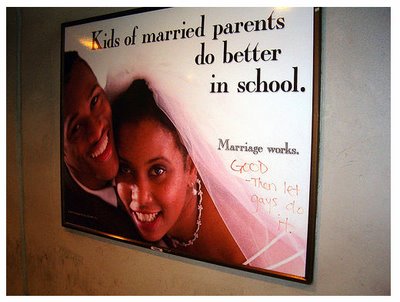
The US Government has decided to market marriage with taxpayer money. If there are clear benefits of marriage, then perhaps promoting it will benefit society. With 4/10 children born out of wedlock in 2005 ,would marriage benefit these children? Does it make a difference when a majority of these births are not to teenage mothers, but women in their 20s?
Ron Haskins of the Brookings Institution claims there are
Four Simple rules to not be poor ( AKA end poverty ) :
1) Graduate from High School
2)Get a job
3)Get married
4)Have a child
The Federal government will spend $100M per year for 5 years promoting marriage, $17B a year for welfare, $35B year for food stamps. The theory is if all those unmarried with children got married - and took on characteristics of those currently married - the poverty rate would drop by 30%. Children would gain because two parent heterosexual and homosexual homes are more stable. Children thrive in an environment low in conflict, which usually have sufficient incomes.
This is quite an undertaking by the Federal Government, because currently there is more emphasis on marriage than education in welfare laws. While all this occurs 10M Americans went hungry , 38M intermittently hungry in 2005. Would marriage have saved them or not?
 In reality work,education, and childcare would reduce poverty greater than a marriage certificate. 80% of the fathers of children out wedlock make a median income of $16K, only $4K more than the Federal poverty level. Getting these men a decent education and assisting them in doing so would reap greater benefits than marriage.
In reality work,education, and childcare would reduce poverty greater than a marriage certificate. 80% of the fathers of children out wedlock make a median income of $16K, only $4K more than the Federal poverty level. Getting these men a decent education and assisting them in doing so would reap greater benefits than marriage.Getting married will also not reduce odds of domestic violence. A person does not change their internal characteristics indefinetely once they gain a marriage certificate.
The funding for this project ( $100M annually ) has come from refugee resettlement and Native American development projects. I would rather the money be returned to these programs than squandered on a social experiment.
Is this idea really in existence to reduce poverty or promote a social conservative perspective of marriage? I have no qualms with marriage, just the idea that it is a cure-all for poverty. And if it is a cure-all will this notion be applied to those who cannot currently marry - both homosexual and polyamorous?
When a homosexual couple adopts, would their child be better off if they were married? What about bisexuals who get together after having a child with another partner? If this experiment proves correct, that marriage is of utmost importance to reducing poverty for children, social conservatives will be in a predicament regarding homosexual couples. They would have to support them marrying, while denouncing their relationship. How odd reality can be!
 And if two incomes are better than one - what about five? What's wrong with a polyfidelitous relationship if it is stable and provides loving nurture to its offspring? That is an avenue few have thought to explore and truly should. These groups exist in America because we are a free nation. To promote only one form of marriage using taxpayer money is not American. You would have to promote all those that work to reduce poverty under this program.
And if two incomes are better than one - what about five? What's wrong with a polyfidelitous relationship if it is stable and provides loving nurture to its offspring? That is an avenue few have thought to explore and truly should. These groups exist in America because we are a free nation. To promote only one form of marriage using taxpayer money is not American. You would have to promote all those that work to reduce poverty under this program.But if you don't agree with my few points, an organization that supports the unmarried has a few more.
1 comment:
Can't agree about polyamory, especially with that new court case. We can't really base marriage on "love" or other such fuzzy standards - but on society's expectations of such issues.
You must have heard the radio show on MPR. Link: http://www.publicradio.org/tools/media/player/news/midmorning/2006/11/22_midmorn1
There is also some lively debate at: http://www.gather.com/viewArticle.jsp?articleId=281474976844025
Post a Comment